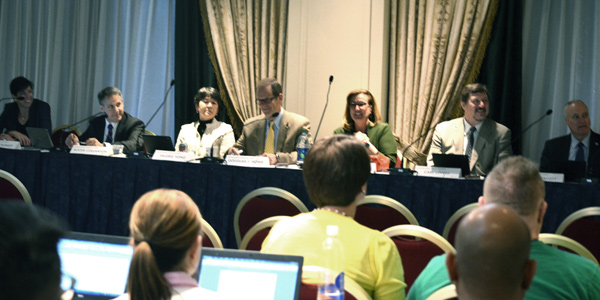By Robert Mullin
CAISO management is proposing to amend the Western Energy Imbalance Market (EIM) charter to explicitly provide the market’s Governing Body with a voice in any future governance changes.
Other charter changes currently under review would give the Governing Body the first — and, in most cases, the last — word on its relationship with two increasingly important stakeholder groups.
The proposed changes were drafted at the request of Governing Body Chair Kristine Schmidt, who wanted more clarity on the body’s role in modifying the charter.
Originally approved by CAISO’s Board of Governors, the EIM’s charter sets out the mission of the Governing Body and details the authority delegated to it by the board over EIM market rules and administration.
The charter currently stipulates that any “substantive changes” to the charter must be approved by the board, as required under the CAISO Tariff. “The role of the EIM Governing Body in considering proposed changes, however, is not specifically addressed,” Roger Collanton, the ISO’s general counsel, noted in a memo addressed to the Governing Body.
Under the proposed revisions, any substantive modifications to the charter would first be presented to the Governing Body for its “advisory” input — similar to the role body members play with respect to ISO market rule changes that also affect the EIM. (See EIM Leaders OK Governance ‘Guidance’ Proposal.)
CAISO management also seeks to extend the authority of the Governing Body over sections of the charter dealing with the EIM’s Body of State Regulators (BOSR) and Regional Issues Forum (RIF), two West-wide groups established by the ISO to monitor and provide feedback on the EIM’s activities.
The proposal would allow the Governing Body to initiate any modifications to those areas of the charter. Approved changes would then be placed on the consent agenda of the board, translating into “a decisional process similar to the one that is used for proposed tariff amendments that fall within the primary authority of the EIM Governing Body,” Collanton’s memo said.
The board would reserve the right to consider — and reject — any proposed changes outside its consent agenda, but “this full consideration will occur only if the board affirmatively decides to take up the issue,” according to the memo.
Other proposed amendments to the charter detail how ISO staff will support the work of the BOSR and RIF, including coordination of meetings, assistance with stakeholder communication and reimbursing state regulators’ staff for travel to attend meetings. RIF members expressed a need for staff support during a Feb. 28 joint meeting with the Governing Body. (See Western Stakeholders Support Continuing Regional EIM Forum.)
CAISO will seek Governing Body endorsement for the charter amendments at a future meeting of the body.






